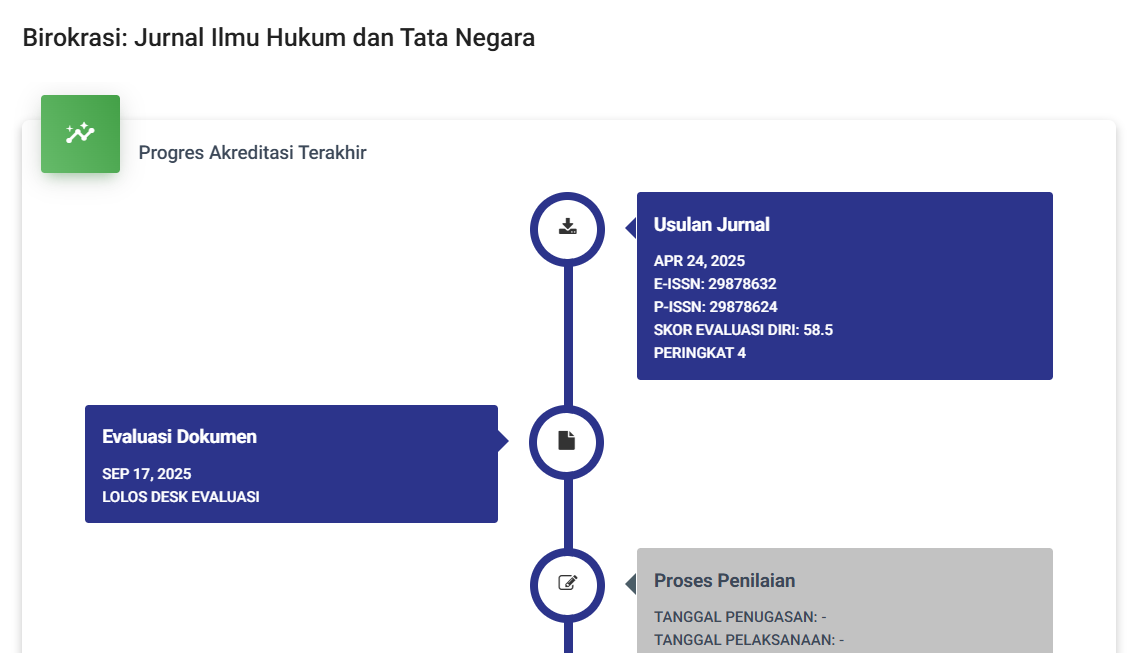Evaluasi Peningkatan Peranan Anggota Linmas Kelurahan Muntang Tampus Kecamatan Prabumulih Barat
DOI:
https://doi.org/10.55606/birokrasi.v2i4.1519Keywords:
Evaluation, Role of Community Society, Linmas MemberAbstract
This study aims to describe the implementation of policies regarding the evaluation of the increasing role of members of Linmas, Muntang Tampus Village, Prabumulih Barat District. Data was collected through interviews, observation, and documentation. Data analysis techniques were carried out by presenting data, reducing data, and drawing conclusions. The results showed that from the development aspect, looking at the very important function of Linmas, the development of the quality of Satlinmas resources must be carried out for the benefit of the people of Muntang Tapus village. Then in terms of presenting prizes to improve the performance of Linmas, it has not really become a special concern, because from a budget perspective and the rules are not clear, even though there should be. Then in terms of the Sat Linmas motivation, namely because of a sense of responsibility that has been mandated, then also because of a sense of wanting to provide a sense of security to the community. While the aspect of HR planning, the kelurahan has planned to improve the quality of Linmas members through training activities and in the future it is not possible in terms of improving education, from the aspect of compensation itself Sat Linmas in an effort to improve performance can not be done optimally, but it is possible in the future to make compensation to improve performance. the work spirit of Limas members. As for the communication aspect, Linmas must maintain good communication with the community and the government in the hope of providing good service to the community as a manifestation of the duties and roles of Linmas. For supporting factors, namely good teamwork that has been embedded in the hearts of every member of the Linmas and a strong sense of family and mutual need for each other are supporting factors in supporting the performance of Linmas as a form of building cooperation. Then the quality of Linmas members who are capable and enjoy and prey in the progress that has been achieved are best placed in each Kelurahan, so the limited number or quantity can be covered by the quality of the Linmas. While the inhibiting factor is that the lack of the number of Linmas members affects the performance to show the role of the Linmas in the community, problems arise when a disaster in the community occurs.
References
Anwar Prabu Mangkunegara. (2006). Evaluasi kinerja SDM. Jakarta: Eresco.
Arikunto, S. (2002). Prosedur penelitian: Suatu pendekatan praktek. Jakarta: PT Rineka Cipta.
Basrowi, & Suwandi. (2008). Memahami penelitian kualitatif. Jakarta: Rineka Cipta.
Commonwealth of Australia Department of Finance. (1989).
Danim, S. (2000). Pengantar studi penelitian kebijakan. Jakarta: Bumi Aksara.
Dharma, S. (2009). Manajemen kinerja: Falsafah, teori, dan penerapannya. Yogyakarta: Pustaka Pelajar.
Dunn, W. N. (2003). Pengantar analisis kebijakan publik. Yogyakarta: Gadjah Mada University Press.
Gibson, J. L., & Ivancevich, J. M. (1992). Organisasi: Perilaku, struktur, proses (Edisi ke-5, Jilid 2). Jakarta: Penerbit Erlangga.
Ivancevich, J. M. (1992). Human resources management: Foundations of personnel.
Moleong, L. J. (2000). Metodologi penelitian kualitatif. Bandung: PT Remaja Rosdakarya.
Moleong, L. J. (2002). Metodologi penelitian kualitatif. Bandung: PT Remaja Rosdakarya.
Moleong, L. J. (2005). Metodologi penelitian kualitatif. Bandung: PT Remaja Rosdakarya.
Ndraha, T. (1989). Konsep administrasi dan administrasi di Indonesia. Jakarta: Bina Aksara.
Notoatmodjo, S. (2003). Pengembangan sumber daya manusia. Jakarta: PT Rineka Cipta.
Simanjuntak, P. J. (2005). Manajemen dan evaluasi kinerja. Jakarta: Lembaga Penerbit Fakultas Ekonomi Universitas Indonesia.
Sugiyono. (2009). Metode penelitian administrasi. Bandung: Alfabeta.
Sugiyono. (2010). Metode penelitian kuantitatif, kualitatif, dan R&D. Bandung: Alfabeta.
Sunyoto, A. (1999). Kualitas kinerja aparatur. Yogyakarta: Kanisius.
Sutopo, H. B. (1996). Metodologi penelitian kualitatif. Surakarta: Universitas Sebelas Maret Press.
Tim Penyusun Modul Sistem AKIP. (2007).








